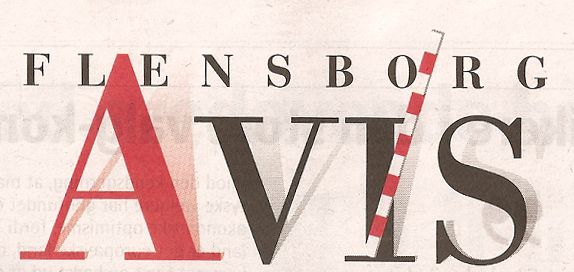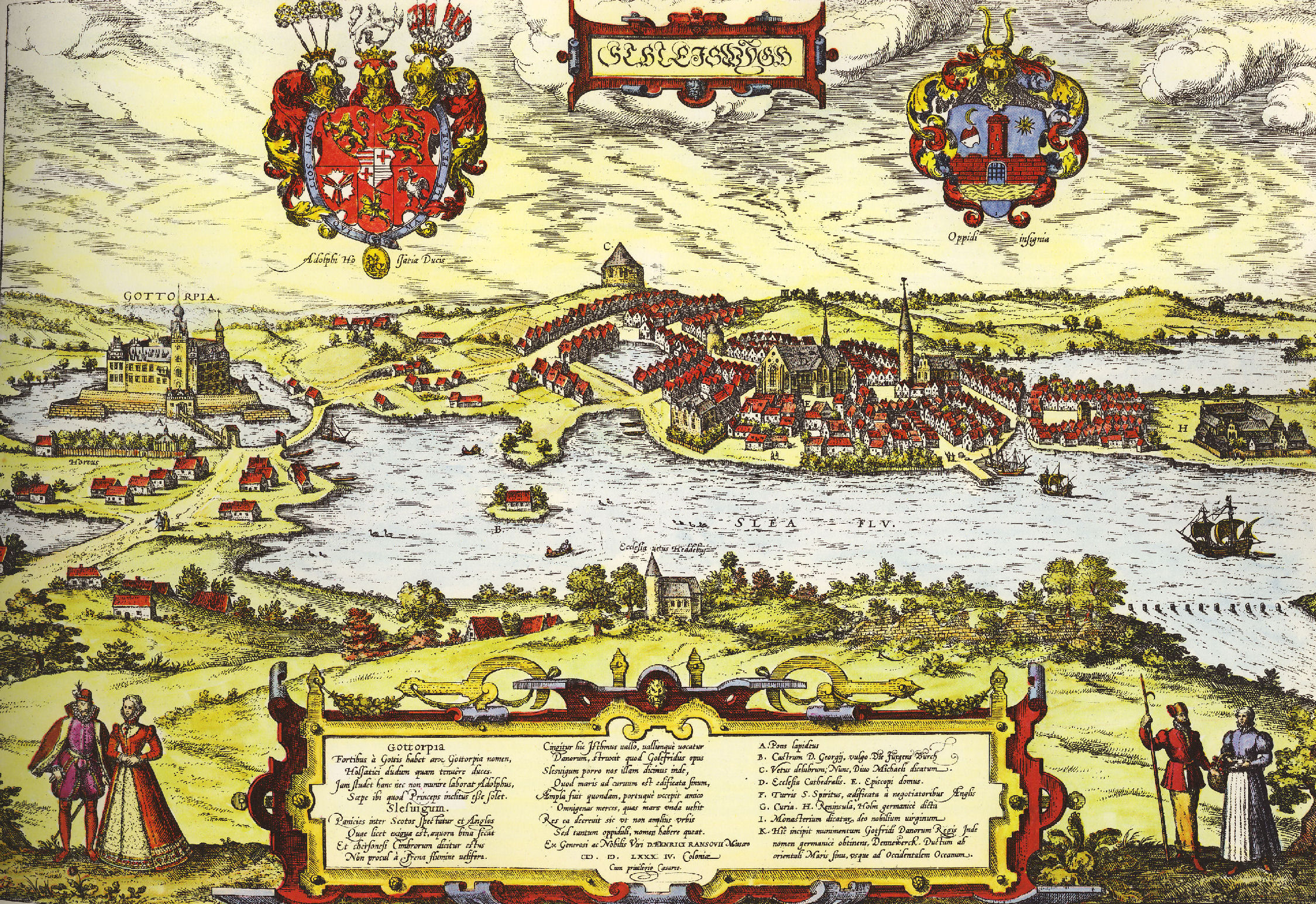|
Flensborg Avis
''Flensborg Avis'' is a Danish language daily newspaper, published in Flensburg ( da, Flensborg), Germany. It regularly cooperates with ''Flensburger Tageblatt'', a German majority newspaper in the city, and ''Der Nordschleswiger'', a German minority newspaper published in Denmark. History and profile ''Flensborg Avis'' was first published on 1 October 1869 in Flensburg by members of the Danish minority in the Province of Schleswig-Holstein. The paper represents the Danish minority in Southern Schleswig. The headquarters of the paper is in Flensburg and there are local editorial offices in the towns of Schleswig (''Slesvig''), Husum and Niebüll (''Nibøl''). The paper is published in Berliner format six times per week. During the Nazi rule in Germany the German supplement of ''Flensborg Avis'', ''Der Schleswiger'', was suspended several times. Since 1974 the paper has a German language section as well. In addition, ''Flensborg Avis'' is co-owner of ''Radio Schleswig-Holstein ... [...More Info...] [...Related Items...] OR: [Wikipedia] [Google] [Baidu] |
Flensborg Avis Logo
Flensburg (; Danish, Low Saxon: ''Flensborg''; North Frisian: ''Flansborj''; South Jutlandic: ''Flensborre'') is an independent town (''kreisfreie Stadt'') in the north of the German state of Schleswig-Holstein. Flensburg is the centre of the region of Southern Schleswig. After Kiel and Lübeck, it is the third largest town in Schleswig-Holstein. The nearest larger towns are Kiel ( south) and Odense in Denmark ( northeast). Flensburg's city centre lies about from the Danish border. Known for In Germany, Flensburg is known for: * the Kraftfahrt-Bundesamt (roughly: National Driver and Vehicle Register) with its ''Verkehrssünderkartei'' (literally: "traffic sinner card file"), where details of traffic offences are stored * its beer '' Flensburger Pilsener'', also called "''Flens''" * the centre of the Danish national minority in Germany * the greeting Moin Moin * the large erotic mail-order companies ''Beate Uhse'' and ''Orion'' * its handball team SG Flensburg-Handewitt * th ... [...More Info...] [...Related Items...] OR: [Wikipedia] [Google] [Baidu] |
Schleswig, Schleswig-Holstein
Schleswig (, , ; da, Slesvig; South Jutlandic: ''Sljasvig''; nds, Sleswig; archaic English: ''Sleswick'') is a town in the northeastern part of Schleswig-Holstein, Germany. It is the capital of the '' Kreis'' (district) Schleswig-Flensburg. It has a population of about 27,000, the main industries being leather and food processing. It takes its name from the Schlei, an inlet of the Baltic sea at the end of which it sits, and ''vik'' or ''vig'' which means "bay" in Old Norse and Danish. Schleswig or Slesvig therefore means "bay of the Schlei". History The Viking settlement of Hedeby, located south of the modern town, was first mentioned in 804. It was a powerful settlement in the Baltic region, dominating the area for more than 200 years. In 1050, following several destructions, the population was moved to the opposite shore of the Schlei, becoming the city of Schleswig. In 1066 Hedeby was finally destroyed, and Schleswig remained as a part of the Danish kingdom. In 1544, Gottor ... [...More Info...] [...Related Items...] OR: [Wikipedia] [Google] [Baidu] |
Daily Newspapers Published In Germany
Daily or The Daily may refer to: Journalism * Daily newspaper, newspaper issued on five to seven day of most weeks * ''The Daily'' (podcast), a podcast by ''The New York Times'' * ''The Daily'' (News Corporation), a defunct US-based iPad newspaper from News Corporation * ''The Daily of the University of Washington'', a student newspaper using ''The Daily'' as its standardhead Places * Daily, North Dakota, United States * Daily Township, Dixon County, Nebraska, United States People * Bill Daily (1927–2018), American actor * Elizabeth Daily (born 1961), American voice actress * Joseph E. Daily (1888–1965), American jurist * Thomas Vose Daily (1927–2017), American Roman Catholic bishop Other usages * Iveco Daily, a large van produced by Iveco * Dailies, unedited footage in film See also * Dailey, surname * Daley (other) * Daly (other) Daly or DALY may refer to: Places Australia * County of Daly, a cadastral division in South Australia * Daly ... [...More Info...] [...Related Items...] OR: [Wikipedia] [Google] [Baidu] |
Mass Media In Flensburg
Mass is an intrinsic property of a body. It was traditionally believed to be related to the quantity of matter in a physical body, until the discovery of the atom and particle physics. It was found that different atoms and different elementary particles, theoretically with the same amount of matter, have nonetheless different masses. Mass in modern physics has multiple definitions which are conceptually distinct, but physically equivalent. Mass can be experimentally defined as a measure of the body's inertia, meaning the resistance to acceleration (change of velocity) when a net force is applied. The object's mass also determines the strength of its gravitational attraction to other bodies. The SI base unit of mass is the kilogram (kg). In physics, mass is not the same as weight, even though mass is often determined by measuring the object's weight using a spring scale, rather than balance scale comparing it directly with known masses. An object on the Moon would weigh less t ... [...More Info...] [...Related Items...] OR: [Wikipedia] [Google] [Baidu] |
Bilingual Newspapers
Multilingualism is the use of more than one language, either by an individual speaker or by a group of speakers. It is believed that multilingual speakers outnumber monolingual speakers in the world's population. More than half of all Europeans claim to speak at least one language other than their mother tongue; but many read and write in one language. Multilingualism is advantageous for people wanting to participate in trade, globalization and cultural openness. Owing to the ease of access to information facilitated by the Internet, individuals' exposure to multiple languages has become increasingly possible. People who speak several languages are also called polyglots. Multilingual speakers have acquired and maintained at least one language during childhood, the so-called first language (L1). The first language (sometimes also referred to as the mother tongue) is usually acquired without formal education, by mechanisms about which scholars disagree. Children acquiri ... [...More Info...] [...Related Items...] OR: [Wikipedia] [Google] [Baidu] |
1869 Establishments In Germany
Events January–March * January 3 – Abdur Rahman Khan is defeated at Tinah Khan, and exiled from Afghanistan. * January 5 – Scotland's oldest professional football team, Kilmarnock F.C., is founded. * January 20 – Elizabeth Cady Stanton is the first woman to testify before the United States Congress. * January 21 – The P.E.O. Sisterhood, a philanthropic educational organization for women, is founded at Iowa Wesleyan College in Mount Pleasant, Iowa. * January 27 – The Republic of Ezo is proclaimed on the northern Japanese island of Ezo (which will be renamed Hokkaidō on September 20) by remaining adherents to the Tokugawa shogunate. * February 5 – Prospectors in Moliagul, Victoria, Australia, discover the largest alluvial gold nugget ever found, known as the "Welcome Stranger". * February 20 – Ranavalona II, the Merina Queen of Madagascar, is baptized. * February 25 – The Iron and Steel Institute is formed in London. * F ... [...More Info...] [...Related Items...] OR: [Wikipedia] [Google] [Baidu] |
Northern Germany
Northern Germany (german: link=no, Norddeutschland) is a linguistic, geographic, socio-cultural and historic region in the northern part of Germany which includes the coastal states of Schleswig-Holstein, Mecklenburg-Vorpommern and Lower Saxony and the three city-states Berlin, Hamburg and Bremen. It contrasts with Southern Germany, Western Germany and Eastern Germany. Language Northern Germany generally refers to the ''Sprachraum'' area north of the Uerdingen and Benrath line isoglosses, where Low German dialects are spoken. These comprise the Low Saxon dialects in the west (including the Westphalian language area up to the Rhineland), the East Low German region along the Baltic coast with Western Pomerania, the Altmark and northern Brandenburg, as well as the North Low German dialects. Although from the 19th century onwards, the use of Standard German was strongly promoted especially by the Prussian administration, Low German dialects are still present in rural areas, with an ... [...More Info...] [...Related Items...] OR: [Wikipedia] [Google] [Baidu] |
Nazism
Nazism ( ; german: Nazismus), the common name in English for National Socialism (german: Nationalsozialismus, ), is the far-right totalitarian political ideology and practices associated with Adolf Hitler and the Nazi Party (NSDAP) in Nazi Germany. During Hitler's rise to power in 1930s Europe, it was frequently referred to as Hitlerism (german: Hitlerfaschismus). The later related term "neo-Nazism" is applied to other far-right groups with similar ideas which formed after the Second World War. Nazism is a form of fascism, with disdain for liberal democracy and the parliamentary system. It incorporates a dictatorship, fervent antisemitism, anti-communism, scientific racism, and the use of eugenics into its creed. Its extreme nationalism originated in pan-Germanism and the ethno-nationalist '' Völkisch'' movement which had been a prominent aspect of German nationalism since the late 19th century, and it was strongly influenced by the paramilitary groups that emerged af ... [...More Info...] [...Related Items...] OR: [Wikipedia] [Google] [Baidu] |
Berliner Format
Berliner, or "midi", is a newspaper format with pages normally measuring about . The Berliner format is slightly taller and marginally wider than the tabloid/compact format; and is both narrower and shorter than the broadsheet format. Origin The Berliner format is an innovation in press and an alternative to the broadsheet format. The name refers to the city of Berlin, and was originally contrasted with "North German" and "French" sizes in the early 20th century. European newspapers The Berliner format is used by many European newspapers, including dailies such as ''Le Monde'' and ''Le Figaro'' in France, ''Le Temps'' in Switzerland, ''La Repubblica'' and '' La Stampa'' in Italy, ''De Morgen'', ''Le Soir'' and '' Het Laatste Nieuws'' in Belgium, ''Oslobođenje'' in Bosnia, ''Mladá fronta Dnes'' and ''Lidové noviny'' in the Czech Republic, and others such as ''Expresso'' in Portugal and ''Jurnalul Național'' or ''Evenimentul Zilei'' in Romania. The French business newsp ... [...More Info...] [...Related Items...] OR: [Wikipedia] [Google] [Baidu] |
Niebüll
Niebüll (Mooring (North Frisian dialect), Mooring North Frisian: ''Naibel''; da, Nibøl) is a town in the district of Nordfriesland, in Schleswig-Holstein, Germany. It is situated near the North Sea coast and the border with Denmark, approx. 35 km northwest of Husum, Germany, Husum. International relations Niebüll is town twinning, twinned with: * Płoty, Poland * Malmesbury, Wiltshire, Malmesbury, England Notable people * Momme Andresen (1857–1951), born in Risum-Lindholm, Risum, educated in Niebüll, industrial chemist who made practical developments in photography including the invention of Rodinal *Carl Ludwig Jessen (1833–1917), painter of North Frisian daily life. *Carsta Löck (1902–1993), actress *Max Hansen (SS officer), Max Hansen (1908–1990), Waffen SS Standartenführer * Bernd Raffelhüschen (born 1957), economist References Towns in Schleswig-Holstein Nordfriesland {{Nordfriesland-geo-stub ... [...More Info...] [...Related Items...] OR: [Wikipedia] [Google] [Baidu] |
Husum
Husum (, frr, Hüsem) is the capital of the ''Kreis'' (district) Nordfriesland in Schleswig-Holstein, Germany. The town was the birthplace of the novelist Theodor Storm, who coined the epithet "the grey town by the sea". It is also the home of the annual international piano festival ''Raritäten der Klaviermusik'' (Rarities of Piano Music) founded in 1986. History Husum was first mentioned as ''Husembro'' in 1252, when king Abel was murdered. Like most towns on the North Sea, Husum was always strongly influenced by storm tides. In 1362 a disastrous storm tide, the "Grote Mandrenke" flooded the town and carved out the inland harbour. Before this date Husum was not situated directly on the coast. The people of the city took advantage of this opportunity and built a marketplace, which led to a great economic upturn. Between 1372 and 1398 the population of Husum grew rapidly, and two villages, ''Oster-Husum'' (East-Husum) and ''Wester-Husum'' (West-Husum), were founded. The name ... [...More Info...] [...Related Items...] OR: [Wikipedia] [Google] [Baidu] |





